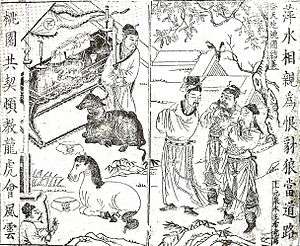Oath of the Peach Garden
| Oath of the Peach Garden | |||||||
| Traditional Chinese | 桃園三結義 | ||||||
|---|---|---|---|---|---|---|---|
| Simplified Chinese | 桃园三结义 | ||||||
| |||||||


The Oath of the Peach Garden is a fictional event in the historical novel Romance of the Three Kingdoms by Luo Guanzhong. This event is set at the end of the Eastern Han dynasty around the time of the Yellow Turban Rebellion in the 180s. Liu Bei, Guan Yu and Zhang Fei took an oath of fraternity in a ceremony in the Peach Garden (believed to be in present-day Zhuozhou, Hebei), and became sworn brothers from then on. Their goal in taking the oath was to protect the Han Empire from the Yellow Turban rebels. The oath bound the three men, who would later play important roles in the establishment of the state of Shu Han during the Three Kingdoms period. It is also often alluded to as a symbol of fraternal loyalty.
The oath
The oath, as it appears in the Wikisource translation of Chapter 1 of Romance of the Three Kingdoms, was this:
When saying the names Liu Bei, Guan Yu and Zhang Fei, although the surnames are different, yet we have come together as brothers. From this day forward, we shall join forces for a common purpose: to save the troubled and to aid the endangered. We shall avenge the nation above, and pacify the citizenry below. We seek not to be born on the same day, in the same month and in the same year. We merely hope to die on the same day, in the same month and in the same year. May the Gods of Heaven and Earth attest to what is in our hearts. If we should ever do anything to betray our friendship, may heaven and the people of the earth both strike us dead.
In many other translations, only the section dealing with "dying on the selfsame day" is present. However, the three brothers do not die on the same day: Guan Yu was killed by Sun Quan's forces in 220; Zhang Fei was assassinated by his subordinates in 221; Liu Bei died of illness in 223, a year after his disastrous defeat at the Battle of Xiaoting.
Historicity
There is no mention of the three men becoming sworn brothers in Chen Shou's Records of the Three Kingdoms, the authoritative source for the history of the late Eastern Han dynasty and the Three Kingdoms period. However, in Guan Yu's biography, their relationship was described to be "as close as brothers", to the point of "sharing the same bed".[1] Zhang Fei's biography also mentioned that Guan Yu was older than Zhang Fei, so Zhang regarded Guan as an elder brother.[2]
Cultural influence
The oath inspired the present-day secret societies in Chinese communities, such as the triads, to use a similar ritual when swearing in new members. "Though not born on the same day of the same month in the same year, we hope to die so" — the phrase the three brothers made during the oath — had also become popular among present-day secret society members.
See also
References
- Chen, Shou. Records of the Three Kingdoms (Sanguozhi).
- Luo, Guanzhong. Romance of the Three Kingdoms (Sanguo Yanyi).